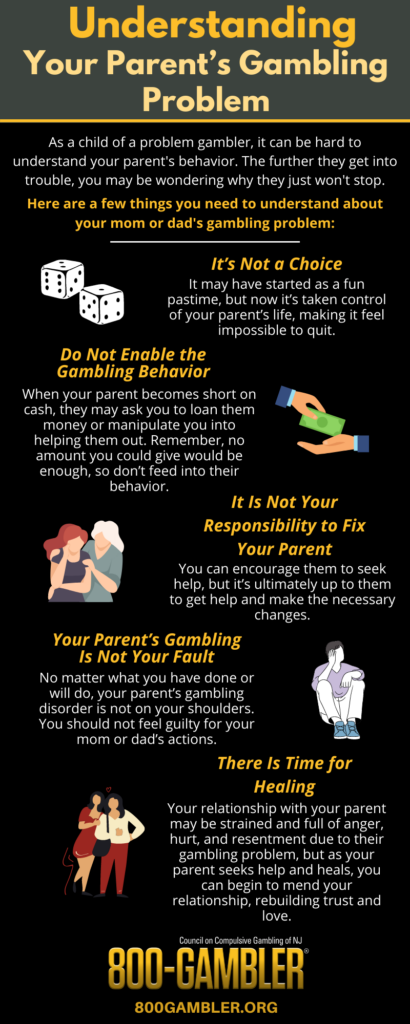Our parents play a critical role in our lives: they show us love, they teach us right from wrong, and they give us advice when we’re lost. Sometimes, however, the roles need to be reversed. A gambling problem can negatively affect your parent’s life, and you may see the issue while they seem to be blinded to it. When this is the case, you may recognize it’s time to talk to your mom or dad about their gambling problem.
Before you can have an open and honest conversation with your mom or dad about their pull to gambling, you need to understand a few things about their behavior. Review the following infographic on your parent’s draw to gambling, then read on for tips on talking with them about their gambling problem.

Focus on Helping, Not Scolding
Discussing your parent’s gambling problem is a delicate topic. You don’t want to come across as angry or accusing; otherwise, this will immediately cause your parent to put up their walls and become defensive.
To ensure you don’t sound like you are scolding your parent, focus on helping them understand your concerns. Mention your own feelings and share some things you’ve observed about their health and well-being. Keep the conversation positive by remembering why you wanted to have this conversation in the first place — whether that’s because you’ve noticed they’ve stopped buying their medications so they can pay for gambling or you’ve seen that their finances cannot support their current lifestyle much longer.
Present Facts
Be honest about the behaviors and consequences you’ve observed as a result of your mom or dad’s gambling problem. What harm or damage has their behavior caused? Share these concrete details with them to paint a clear picture. Remember to stay calm. If you feel yourself getting angry or upset, it may be time to step away for a few moments for everyone to collect themselves.
Be an Active Listener
Remember, this is a conversation — not an intervention. This means each person should have a chance to share their thoughts and feelings. Listen to your parent’s side of things, even if you disagree with what they’re saying. By actively listening and acknowledging their point of view, you show them respect and provide the listening ear they may have been craving. When they feel validated, they’ll be more open to receiving your concerns.
Together, Create a List of Reasons They Shouldn’t Gamble
If the conversation is going well, suggest creating a list of reasons your parent shouldn’t gamble. This list can be a source of motivation as your dad or mom is overcoming their problem with gambling. Whenever they feel like gambling, they can read the list and remember why it’s in their best interest to say no to another hand or bet. These reasons could include not wanting to disappoint their family and avoiding financial debt.
Once you’ve come up with a few reasons together, give your parent time to come up with their own personal reasons for quitting. Then, they can carry this page around with them day after day.
Give Them Time
After sharing your concerns about your parent’s gambling disorder, give them time to think about everything you shared. It’s often challenging for parents to accept the changing dynamics of a parent-child relationship when the child becomes an adult. They’ll likely need time to set aside their own feelings to realize that you were approaching them out of love and not judgment. As you continue to love and support them, your parent may grow comfortable enough to reach out for professional help.
Remember, You Are Not Alone
Confronting anyone about an issue is never easy, but it’s especially hard when you have to share your concerns about your parent with them. They’re used to taking care of you and may resent you taking a parenting position. You may only need to have one conversation with your mom or dad before they seek help, or you may have to have several conversations. The important thing to do is be patient, stay calm, and remember why you wanted to have this conversation with your parent in the first place.
To be better prepared for your conversation about your parent’s gambling problem, review our resources on gambling disorders, including how gambling addiction affects the family. You can also seek guidance in Gamblers Anonymous online meetings from other people who have been in your position. Any time you or your loved one needs help overcoming their problems with gambling, you can reach out to 800-GAMBLER for a better future.



